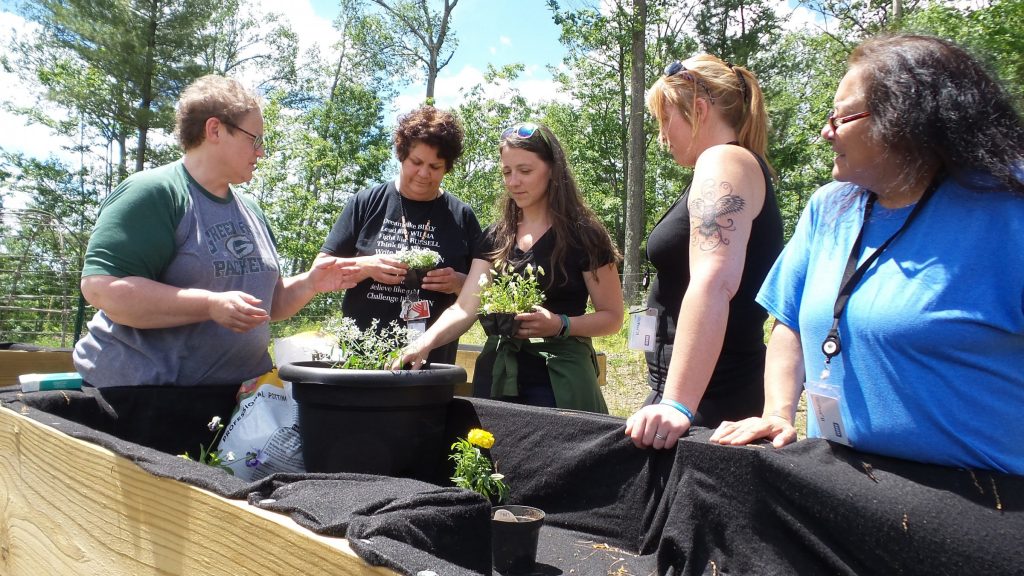
Pathways of Change
“Programming” can be thought of as an on-going process in which we design, deliver and evaluate educational, extension and/or research activities in order to help transform our lives, our organizations and our communities. This hands-on presentation provides an opportunity for participants to explore their own program logic and connect it with larger theories of change through a step-wise pathways of change approach. Participants can expect to engage in a number of fun, practical exercises that will help them think about their programs in different ways and confidently apply new program development and evaluation skills directly to their own work.
Speaker Biography

Samuel Pratsch has over 15 years of experience designing and implementing evaluations of community-based, non-formal education programs related to agricultural, nature resources, and environmental education programs. Currently, he works as an evaluation specialist at the UW Environmental Resources Center. In his work, he creates opportunities for individuals and organizations to learn from and improve their projects and programs through rigorous and innovative approaches to program development and evaluation. He works with community-based organizations, higher education institutions, foundations, and nonprofits across a range of social and environmental issues. He has expertise in building evaluation capacity, designing and conducting evaluation studies, analyzing and using evaluation data, developing practical evaluation tools like surveys and questionnaires, using participatory and empowerment evaluation strategies and techniques, and conceptualizing program logic and using theories of change.
Presentation
- Tuesday morning, August 7, 2018
- PowerPoint
Related Information
- Program Development and Evaluation, UW-Extension
Speed-Round Presenters
Using the Horticulture Continuum of Learning to Build Community Engagement Tool-kits for Volunteer Educational Outreach
Using the Horticultural Continuum of Learning, the Minnesota Master Gardener Volunteer Program state leadership team is developing capacity in volunteers to work within their communities through the creation of Community Engagement Toolkits. Using the Continuum, educational materials are created to meet a variety of audience levels and methods of outreach. For example, materials are created to bring awareness to the content, such as buttons and flyers. To continue building interest, Master Gardeners can use specially created brochures, flyers, handouts, fact sheets, and walk-by interpretive signage for gardens. For knowledgeable audiences, volunteers can teach a class with a prepared presentation, handouts, or activities. Not only do these materials reach new and different audiences through a variety of methodologies, but encourage volunteers to consider their educational efforts in a different capacity to reach non-traditional audiences. To facilitate in this, tool-kits are packaged to match common methods of volunteer outreach, such as planting gardens, setting up tables, or direct education.
 Christy Marsden, Extension Educator and Education Manager, University of Minnesota Extension
Christy Marsden, Extension Educator and Education Manager, University of Minnesota Extension- PowerPoint
Guiding tool for measuring and reporting the public value of volunteer activities
Measuring and reporting the public value of volunteer activities completed by Master Gardeners is not always easy. We have created a guiding tool to facilitate identifying the outputs, outcomes and impacts of different types of volunteer work. The multi-part tool includes a At-A-Glance Guide, a Worksheet and a Project Report as an example. This tool is assisting Master Gardeners in Minnesota demonstrate the benefits that their work brings to their audiences and their communities.
 Jackie Froemming, Extension Educator, University of Minnesota Extension
Jackie Froemming, Extension Educator, University of Minnesota Extension- Public Value Info Sheet
- PowerPoint
Spotlight on Impact
Looking for a way to stay focused on impact? Learn how the University of Rhode Island Master Gardener Program developed and implemented a multi-year focus area. The goal of the focus area is to concentrate the efforts of staff and volunteers in a strategic way toward a relevant issue facing local communities. This issue-based focus was selected by conducting a needs assessment with key partners, aligning with state Cooperative Extension priorities and consulting with Master Gardeners in top leadership positions. With a common set of behavior change goals, the focus area serves as a guide for volunteer training topics, public education efforts and program evaluation for the next two to three years.
 Vanessa Venturini, State Program Leader, University of Rhode Island Cooperative Extension
Vanessa Venturini, State Program Leader, University of Rhode Island Cooperative Extension- WATCH Spotlight on Impact



